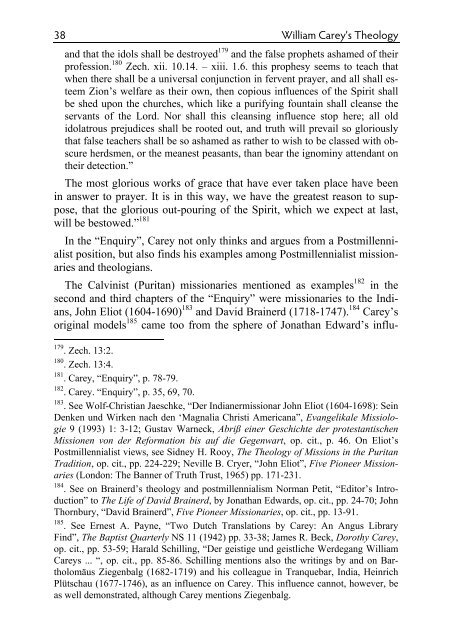William Careys Theology - World Evangelical Alliance
William Careys Theology - World Evangelical Alliance
William Careys Theology - World Evangelical Alliance
Create successful ePaper yourself
Turn your PDF publications into a flip-book with our unique Google optimized e-Paper software.
38 <strong>William</strong> Carey’s <strong>Theology</strong><br />
and that the idols shall be destroyed 179 and the false prophets ashamed of their<br />
profession. 180 Zech. xii. 10.14. – xiii. 1.6. this prophesy seems to teach that<br />
when there shall be a universal conjunction in fervent prayer, and all shall esteem<br />
Zion’s welfare as their own, then copious influences of the Spirit shall<br />
be shed upon the churches, which like a purifying fountain shall cleanse the<br />
servants of the Lord. Nor shall this cleansing influence stop here; all old<br />
idolatrous prejudices shall be rooted out, and truth will prevail so gloriously<br />
that false teachers shall be so ashamed as rather to wish to be classed with obscure<br />
herdsmen, or the meanest peasants, than bear the ignominy attendant on<br />
their detection.”<br />
The most glorious works of grace that have ever taken place have been<br />
in answer to prayer. It is in this way, we have the greatest reason to suppose,<br />
that the glorious out-pouring of the Spirit, which we expect at last,<br />
will be bestowed.” 181<br />
In the “Enquiry”, Carey not only thinks and argues from a Postmillennialist<br />
position, but also finds his examples among Postmillennialist missionaries<br />
and theologians.<br />
The Calvinist (Puritan) missionaries mentioned as examples 182 in the<br />
second and third chapters of the “Enquiry” were missionaries to the Indians,<br />
John Eliot (1604-1690) 183 and David Brainerd (1718-1747). 184 Carey’s<br />
original models 185 came too from the sphere of Jonathan Edward’s influ-<br />
179 . Zech. 13:2.<br />
180 . Zech. 13:4.<br />
181 . Carey, “Enquiry”, p. 78-79.<br />
182 . Carey. “Enquiry”, p. 35, 69, 70.<br />
183 . See Wolf-Christian Jaeschke, “Der Indianermissionar John Eliot (1604-1698): Sein<br />
Denken und Wirken nach den ‘Magnalia Christi Americana”, Evangelikale Missiologie<br />
9 (1993) 1: 3-12; Gustav Warneck, Abriß einer Geschichte der protestantischen<br />
Missionen von der Reformation bis auf die Gegenwart, op. cit., p. 46. On Eliot’s<br />
Postmillennialist views, see Sidney H. Rooy, The <strong>Theology</strong> of Missions in the Puritan<br />
Tradition, op. cit., pp. 224-229; Neville B. Cryer, “John Eliot”, Five Pioneer Missionaries<br />
(London: The Banner of Truth Trust, 1965) pp. 171-231.<br />
184 . See on Brainerd’s theology and postmillennialism Norman Petit, “Editor’s Introduction”<br />
to The Life of David Brainerd, by Jonathan Edwards, op. cit., pp. 24-70; John<br />
Thornbury, “David Brainerd”, Five Pioneer Missionaries, op. cit., pp. 13-91.<br />
185 . See Ernest A. Payne, “Two Dutch Translations by Carey: An Angus Library<br />
Find”, The Baptist Quarterly NS 11 (1942) pp. 33-38; James R. Beck, Dorothy Carey,<br />
op. cit., pp. 53-59; Harald Schilling, “Der geistige und geistliche Werdegang <strong>William</strong><br />
<strong>Careys</strong> ... “, op. cit., pp. 85-86. Schilling mentions also the writings by and on Bartholomäus<br />
Ziegenbalg (1682-1719) and his colleague in Tranquebar, India, Heinrich<br />
Plütschau (1677-1746), as an influence on Carey. This influence cannot, however, be<br />
as well demonstrated, although Carey mentions Ziegenbalg.
















